| Published: | 2010-11-13 |
| Manufacturer: | Sunward Aerospace  |
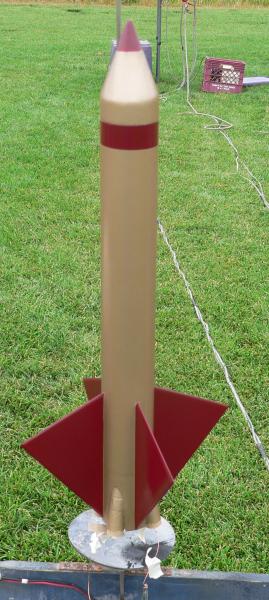 (06/24/08) The Sunward Eruption™ rocket caught
my attention recently due to its cluster of four canted motors.
(06/24/08) The Sunward Eruption™ rocket caught
my attention recently due to its cluster of four canted motors.
Canted motors are not new and in my opinion FlisKits' Deuce's Wild two canted motor configuration made them popular these days. FlisKits also offers the Tres with three canted motors.
So now enter Sunward's Eruption™, with the four canted motors. Sunward calls them "Inclined Motors". The kit also features four large swept-forward fins that give it an interesting look.
The rocket includes a single 2.175" diameter brown paper body tube that is 18" long. There is a 4" balsa nose cone and four laser-cut light-ply fins. The motor mount contains laser-cut centering rings, four 18mm motor tubes, four motor hooks and thrust rings. The recovery system includes a rubber shockcord, plastic parachute (needs assembled), and an eye-screw for the nose cone. There are no decals for the rocket.
CONSTRUCTION:
The instructions are printed on six pages of 8½ x 11" paper which include a Launch Prep section and both the NAR and CAR safety codes. There is also an insert for Clustering Techniques and Tips. The instructions include illustrations to assist in the build.
Sunward calls this a Skill Level 3 kit. I would say this only because of the canted motor mount assembly.
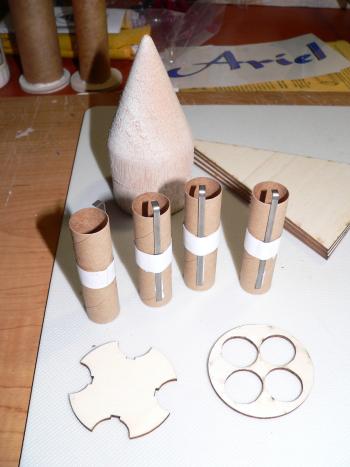 I did not find the instructions to be laid out in a
straight-forward way. The fonts and formats are not consistent and each sub-step is not clearly denoted. However, if
you are a skill level 3 builder you would be able to follow them and be successful. I found one error in the
instructions in Step 2, E it says "you should now have 2 as shown" and it should say 4.
I did not find the instructions to be laid out in a
straight-forward way. The fonts and formats are not consistent and each sub-step is not clearly denoted. However, if
you are a skill level 3 builder you would be able to follow them and be successful. I found one error in the
instructions in Step 2, E it says "you should now have 2 as shown" and it should say 4.
I found the motor tubes to be especially thin and they seemed to collapse easily when cutting the slit for the motor hook and during other steps. Just an observation at the time of the build.
The motor hooks are placed onto each motor tube and glued in place with a paper strip that you cut out from a template. Take note that these paper strips show on the finished rocket, so plan for the overlap to be near the motor hook! (I didn't)
The motor mount is clearly the most difficult component of the build. I read the instructions and I practiced the process. During that practice it dawned on me that it would be easier if there was a spacer to hold the aft centering ring in place. I made one using a 1/4" tube. This is not necessary, but it helped me.
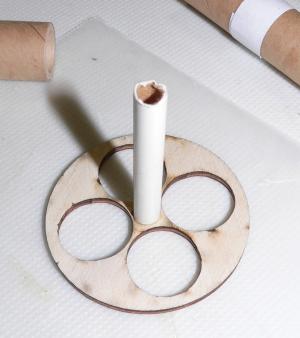
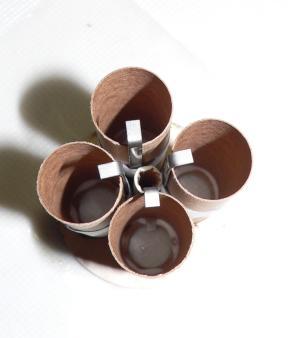
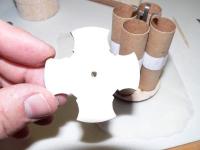 I first drilled a 1/4" into the center of the aft centering
ring. I then used CA to glue the 1/4" tube in place onto the center of the forward centering ring. Then I placed
all the motor tubes in place and used the drill bit to hold the aft centering ring in place.
I first drilled a 1/4" into the center of the aft centering
ring. I then used CA to glue the 1/4" tube in place onto the center of the forward centering ring. Then I placed
all the motor tubes in place and used the drill bit to hold the aft centering ring in place.
I then set that assembly onto two 1/8" dowels to ensure the motor tubes protruded out the forward centering ring the right amount.
Then I used gel CA (Gorilla Super Glue) to touch-weld the tubes to the centering rings. I followed up with wood glue fillets all around.
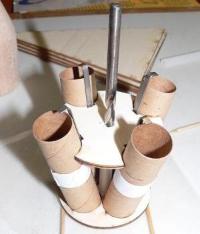
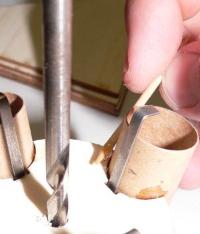
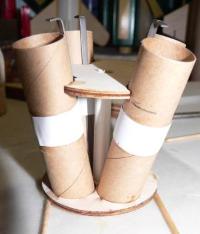
Worked for me.
The tube cutting and marking template fit perfectly. I made the cuts using a brand new blade. I had to do one little trim afterward.
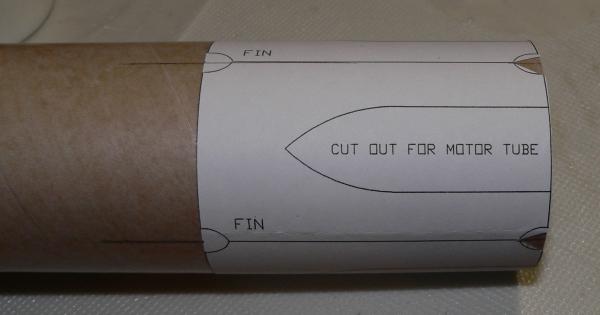
 The motor mount slid in perfectly.
The motor mount slid in perfectly.
Fins get rounded or air-foiled and glued in place. Nice arrangement.
After I popped on the 3/16" launch lug the rocket was ready to be finished.
I used DecoArt Sealer on the nose cone. About 4 coats, lightly sanding in-between. I then used plenty of Plasti-Kote Primer. Painted it with DupliColor automotive paint. It was not perfect, but it was now ready for NERRF4.
Overall, for CONSTRUCTION I would rate this kit 3 points. Other than the motor mount it is an easy kit to build, however, the instructions were lacking and those soft motor tubes concerned me. There were no decals with this kit which caught my attention as well, especially with so many of the kit manufacturers adding quality decals these days. The laser-cut parts and light-ply fins bring the score back up to average (a good score).
FLIGHT/RECOVERY:
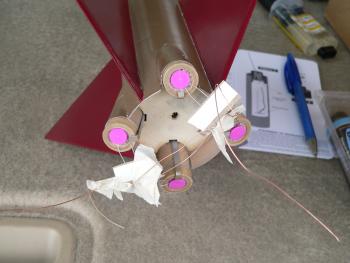 Sunward recommends four of any of the Estes 18mm motors.
Sunward recommends four of any of the Estes 18mm motors.
My finished rocket weighed in at 6.2 ounces with a CG at 12.375 from the nose cone.
Since I was at a great field, NERRF, I decided to fly it for the first time on four (4) C6-5's. I positioned the ignitors in pairs and twisted them together. I then tied the pairs together with some thin cooper wiring from used QuickBurst ignitors. I then used tape to prevent twists from moving around and touching each other.
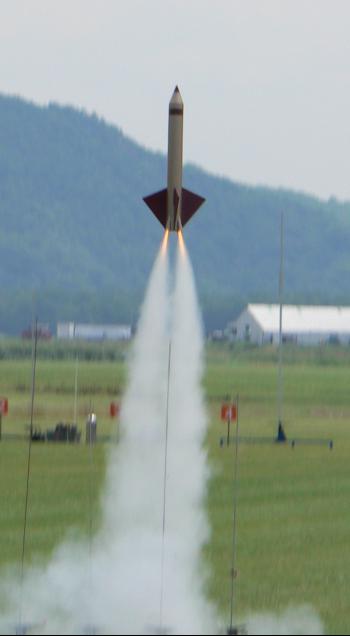 The Eruption™ has such a wide body tube so I used a piece of
Nomex®
attached to the rubber shockcord. I folded the plastic parachute and placed it into the Nomex®
and then put all that into the body tube. Ready.
The Eruption™ has such a wide body tube so I used a piece of
Nomex®
attached to the rubber shockcord. I folded the plastic parachute and placed it into the Nomex®
and then put all that into the body tube. Ready.
All four (4) C6-5's lit perfectly and this rocket went straight up, and I mean perfectly straight up. I must have done a good job on the fin alignment. I captured this nice lift-off picture.
Ejection was early by a couple of seconds and the parachute was sized correctly (in my opinion) for the weight of rocket.
The next morning, I ran by the Walmart and purchased two packages of C6-7's. I prepared the Eruption™ the same way as above with four (4) C6-7's.
This time, even though all the motors lit, the rocket came off the pad straight and then took off at an angle (see video below). I imagine one motor either had a delayed ignition or just burned differently. Ejection was good and the rocket was recovered.
For FLIGHT/RECOVERY, I would rate this rocket 5 points. It is a great feeling to get all the motors to light and then to see the canted (inclined) flame and smoke. The parachute is sized correctly and all-in-all it is a stable flying rocket.
I give the rocket an OVERALL rating of 4 points. If you are experienced at building you will have no trouble building this rocket. The overall experience is positive. Where I felt there were shortcomings in the instructions, motor tubes, and decals, the actual flight experience and stability made up for it. Give this rocket a try.
Update:
Adding a couple of pictures that were taken at NERRF4 (by Brian?)... if you
look closely, perhaps that far motor did not come up to full power
with the others sending it off in that direction. Notice, too, the Eruption™ is launching right next to my
Rocket Pad Shooting
Star.
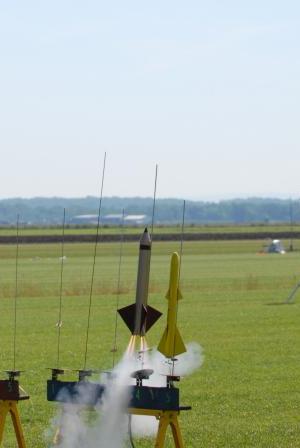
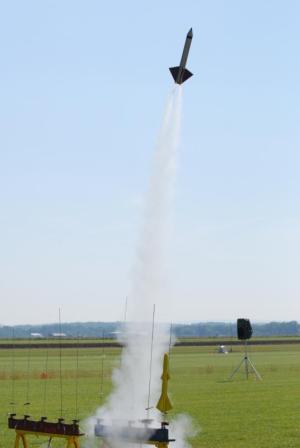
Other Reviews
- Sunward Aerospace Eruption By Peter Stanley (July 21, 2009)
Brief: The Eruption is 4-motor cluster from Sunward Aerospace. The motors are outwardly canted. Recovery is via an 18" parachute. Construction: The kit includes a balsa nose cone, one BT-70 body tube, two laser cut centering rings, four motor tubes with clips, parachute materials, four laser cut lite-ply fins, and an elastic shock cord. Construction was very s ...
 |
 |
Flights
 |
 |